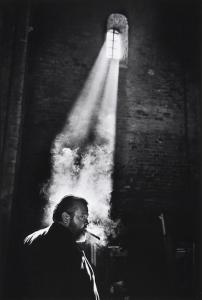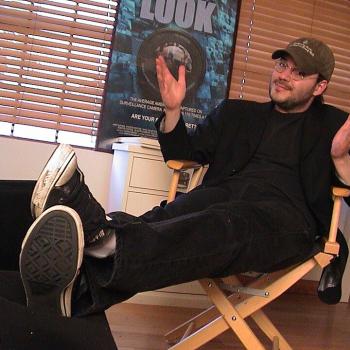
Source: Flicker user Recuerdos de Pandora
License
Orson Welles’ F for Fake (1973) is, for all its pretense of devilishness, a very Thomistic movie. I’m not sure I’ve ever seen another film so singularly invested in matching form and matter (or, if you like, content). Ostensibly, the piece investigates an art forger (Elmyr de Hory) and his duplicitous biographer (Clifford Irving), who claims to tell the truth about Elmyr’s fantastic successes, even as we know he has lied in another book (a biography of Howard Hughes). The experience of watching F has little to do with this case, however: from early on Welles guarantees us that, for the next hour, everything he says will be true (guess what happens when the hour is up?). We know these men are, in the eyes of the world, snakes and thieves; the documentary itself tells us very little we don’t know from the start, and whatever it does relay is interrupted so thoroughly by the movie’s jarring form that it immediately passes from our minds. Lies, lies, and damn cutting.
But that’s the issue: you can’t talk straight about lying. Elmyr risks losing what little he has if he’s too specific about his own background and the forgeries he’s placed with (alarming) success. Clifford Irving’s past makes him unbelievable. And why should we (as Welles himself points out) trust a director and narrator responsible for one of America’s most famous radio hoaxes, the War of the Worlds broadcast? Whatever facticity there is to glean here must come from foregrounding how false everyone involved is. At minimum, the movie argues, we all lie sometimes. And many of us lie a whole lot more than that.
All the quick cuts, freeze frames, and shots of Welles pontificating from the editing room serve to take this premise and add yet another layer: artists are the greatest liars of all. Why do you think Plato wanted to throw out the poets? There is, of course, a banal sense in which to write fiction is to lie, insofar as all imagination involves deviating from some journalistic notion of the facts. But Welles’ point is more provocative: what if to tell the truth, one must lie?
As the film states, Elmyr may be a forger, but there could be no forgers without an art market filled with experts who assign value based on artistic hierarchies they themselves instantiate. If Elmyr can fool the experts, has he not shown the whole business to be a farce? Are the experts, then, the real liars? Are they magicians who have us all under their sway, buying into their confidence game? In this telling, Elmyr is a regular gumshoe, a Seymour Hersh or Gary Webb. What about Irving? If he made up those stories about Hughes, does that not invite attention to the reclusive magnate, suggest a new way of seeing a man otherwise immune to criticism?
Late in the film, Welles asks a question: when did we start assigning value based on name? Is Chartres Cathedral any less beautiful, any less likely to outlast us, because it cannot be attributed to a single genius? I couldn’t help but think of my old hobby horse, the inspiration for this blog’s name, Piers Plowman.
The text is sprawling and complicated in ways those of us reared in the world of modern publishing can’t imagine. What came to mind, however, was not this general complexity, but a specific moment in the poem. In Passus II, the author (William Langland) has Favel (deceit, cunning) arrange the marriage of Mede (justice, equity, reward) and False (False). In the B-Text (told you it was complicated), Langland writes:
And now will Meed be married all to a cursed wretch,
To one Fickle-Tongue offspring of a fiend.
Flattery through his fair speech hath this folk enchanted,
And all is Liar’s leading that she is thus wedded.
“Enchanted” (“enchaunted” in the original) gets to the heart of the matter. In F, Welles conveys a friend’s sentiment: a magician is just an actor playing a magician. Perhaps so, but the matter of the actor is as much enchantment as it is that of the magician. Social relations are, as Langland saw, far too often, if not essentially, a confidence game. The question is whose treachery serves truth. Or, as Langland goes on:
Such weddings to wangle to work against Truth;
And ere this wedding be wrought woe thee betide!
For Meed is a woman of Amends engendered,
And God granted to give this Meed to Truth;
Thou hast given her a beguiler now God give thee sorrow!
Thy text telleth thee not so Truth knows the sooth,
For dignus est operarius his hire to have;
Thou hast fastened her to Falsehood; fie on thy law!
The choice, then, is to marry Mede either to False or to Truth.
Langland was a deeply religious man confronted with a collapsing society (not that we’d know anything about that). Despite a dull day job he took up the (lying) pen and created a world of dreams within dreams, presumably with the idea that allegorically unpacking the root causes of decayed social relations would do something, change something. In this sense, even in calling out Favel and False, he took to fiction in the name of truth. Truth cannot, it seems, speak for itself.
We might think of Langland as something of an Elmyr. Welles too, of course.













